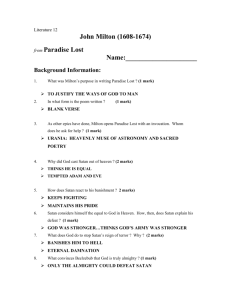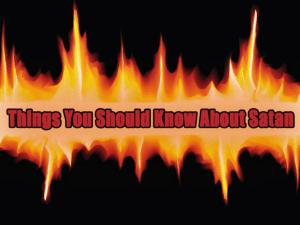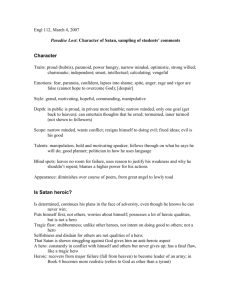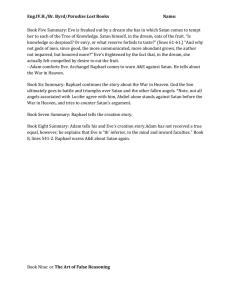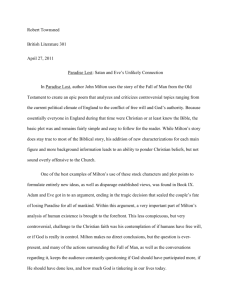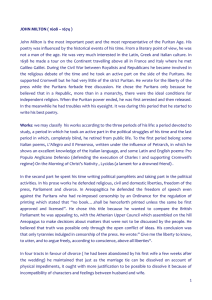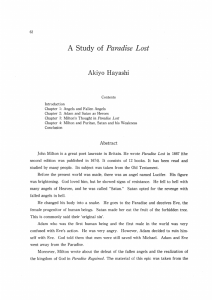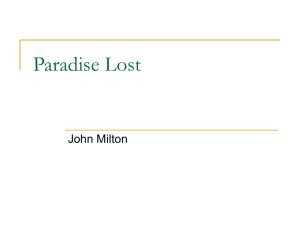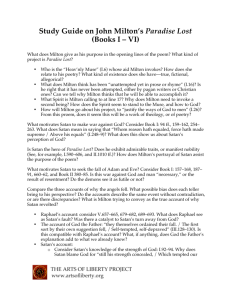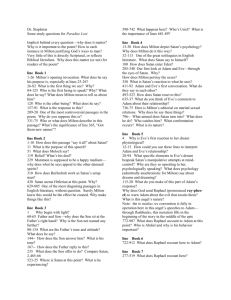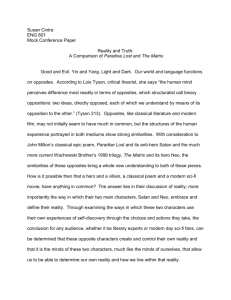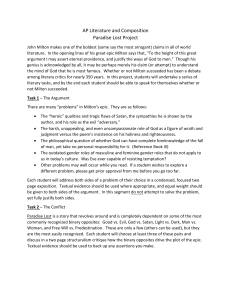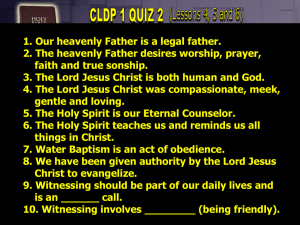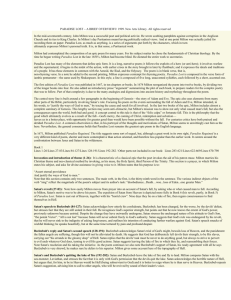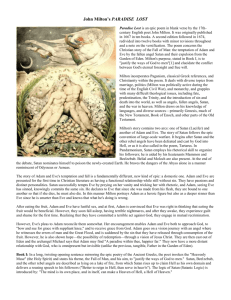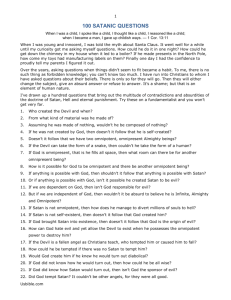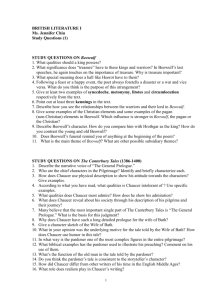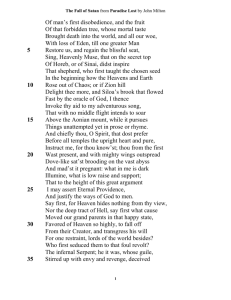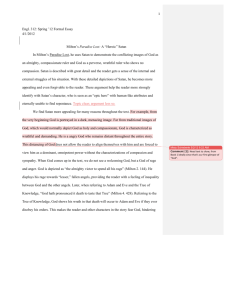How does Frankenstein relate to Paradise Lost
advertisement
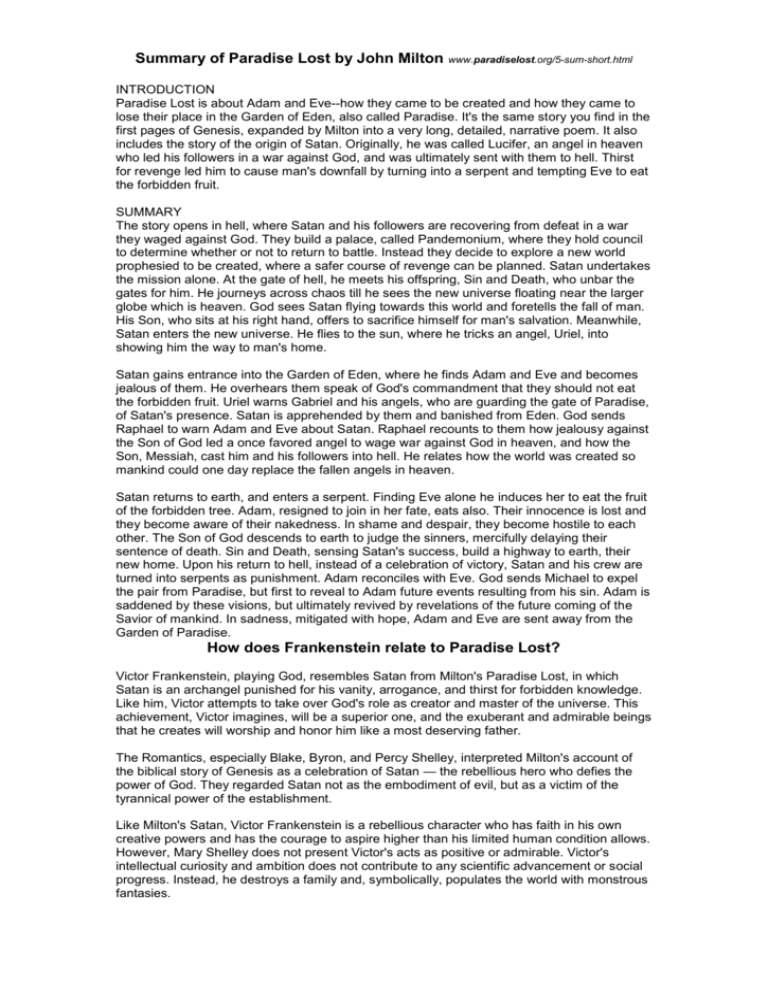
Summary of Paradise Lost by John Milton www.paradiselost.org/5-sum-short.html INTRODUCTION Paradise Lost is about Adam and Eve--how they came to be created and how they came to lose their place in the Garden of Eden, also called Paradise. It's the same story you find in the first pages of Genesis, expanded by Milton into a very long, detailed, narrative poem. It also includes the story of the origin of Satan. Originally, he was called Lucifer, an angel in heaven who led his followers in a war against God, and was ultimately sent with them to hell. Thirst for revenge led him to cause man's downfall by turning into a serpent and tempting Eve to eat the forbidden fruit. SUMMARY The story opens in hell, where Satan and his followers are recovering from defeat in a war they waged against God. They build a palace, called Pandemonium, where they hold council to determine whether or not to return to battle. Instead they decide to explore a new world prophesied to be created, where a safer course of revenge can be planned. Satan undertakes the mission alone. At the gate of hell, he meets his offspring, Sin and Death, who unbar the gates for him. He journeys across chaos till he sees the new universe floating near the larger globe which is heaven. God sees Satan flying towards this world and foretells the fall of man. His Son, who sits at his right hand, offers to sacrifice himself for man's salvation. Meanwhile, Satan enters the new universe. He flies to the sun, where he tricks an angel, Uriel, into showing him the way to man's home. Satan gains entrance into the Garden of Eden, where he finds Adam and Eve and becomes jealous of them. He overhears them speak of God's commandment that they should not eat the forbidden fruit. Uriel warns Gabriel and his angels, who are guarding the gate of Paradise, of Satan's presence. Satan is apprehended by them and banished from Eden. God sends Raphael to warn Adam and Eve about Satan. Raphael recounts to them how jealousy against the Son of God led a once favored angel to wage war against God in heaven, and how the Son, Messiah, cast him and his followers into hell. He relates how the world was created so mankind could one day replace the fallen angels in heaven. Satan returns to earth, and enters a serpent. Finding Eve alone he induces her to eat the fruit of the forbidden tree. Adam, resigned to join in her fate, eats also. Their innocence is lost and they become aware of their nakedness. In shame and despair, they become hostile to each other. The Son of God descends to earth to judge the sinners, mercifully delaying their sentence of death. Sin and Death, sensing Satan's success, build a highway to earth, their new home. Upon his return to hell, instead of a celebration of victory, Satan and his crew are turned into serpents as punishment. Adam reconciles with Eve. God sends Michael to expel the pair from Paradise, but first to reveal to Adam future events resulting from his sin. Adam is saddened by these visions, but ultimately revived by revelations of the future coming of the Savior of mankind. In sadness, mitigated with hope, Adam and Eve are sent away from the Garden of Paradise. How does Frankenstein relate to Paradise Lost? Victor Frankenstein, playing God, resembles Satan from Milton's Paradise Lost, in which Satan is an archangel punished for his vanity, arrogance, and thirst for forbidden knowledge. Like him, Victor attempts to take over God's role as creator and master of the universe. This achievement, Victor imagines, will be a superior one, and the exuberant and admirable beings that he creates will worship and honor him like a most deserving father. The Romantics, especially Blake, Byron, and Percy Shelley, interpreted Milton's account of the biblical story of Genesis as a celebration of Satan — the rebellious hero who defies the power of God. They regarded Satan not as the embodiment of evil, but as a victim of the tyrannical power of the establishment. Like Milton's Satan, Victor Frankenstein is a rebellious character who has faith in his own creative powers and has the courage to aspire higher than his limited human condition allows. However, Mary Shelley does not present Victor's acts as positive or admirable. Victor's intellectual curiosity and ambition does not contribute to any scientific advancement or social progress. Instead, he destroys a family and, symbolically, populates the world with monstrous fantasies.
